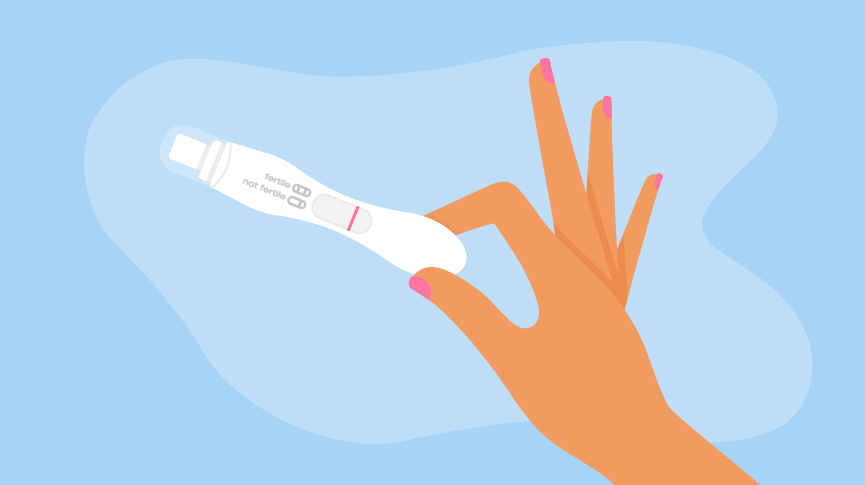What to Know About Home Fertility Tests

One of the coolest ways that the technological revolution has affected our healthcare is by giving us more access to things that can give us clear insights into our health.
This has given us more bodily autonomy and choice over how we want to navigate our health.
This has been especially helpful in the world of reproductive health, where the female body is so often debated and regulated.
At-home tests give people the option to get information about their bodies and health, from the convenience of their own home. There are a growing number of at-home tests available including one for sexually transmitted infections, food sensitivities, and of course – fertility.
Understanding Ovulation
Conception can be a tricky journey and the path to pregnancy can sometimes take a bit more work than you realized.
Understanding your menstrual cycle and ovulation can give you key insights into your health, and is also one of the first steps when you’re trying to get pregnant.
Most people who menstruate are only able to get pregnant on about six days out of their cycle. This is typically the five days leading up to ovulation, and the day of.
Still, even when you have this information it doesn’t necessarily mean getting pregnant is easy. Maybe you have other health reasons like PCOS that make your cycle irregular, and ovulation difficult to predict. Perhaps you’re wondering how much longer you have in your fertility window.
Or you just want to understand your hormone levels and what fertility looks like for you and your body.
Whatever your reasons are, home fertility tests can give you the answers you need.
What is an At-Home Fertility Test?
At-home fertility tests use simple measures to detect hormone levels and/or ovulation and give users insights into their fertility.
Although difficulties with conceiving can also be due to sperm, we’re going to be focusing on the female body and tests that target it. There are also at-home fertility tests for men and people with penises that test sperm count, motility, and shape.
There are a couple of different kinds of at-home fertility tests for people with uteruses.
Ovarian Reserve Tests
One type is a hormone analysis test that involves collecting a small sample of blood at home or urinating on a test strip. After it’s sent to a lab for testing, you will receive an analysis of your hormone levels and how they relate to your fertility.
Also known as Ovarian Reserve Tests, these tests detect the amount of follicle-stimulating hormone (FSH) that is in your bloodstream. FSH is produced in the pituitary gland and is crucial for egg growth and maturation, as well as menstruation.
If you have high levels of this hormone it could mean that your ovaries are working overtime because you have fewer eggs remaining.
Ovulation Predictor Kits
OPKs, or ovulation predictor kits, do exactly what you think they would – predict ovulation. These are a great choice if you have a regular cycle so you know when exactly you’re ovulating.
OPKs are helpful, used instead of or along with other types of ovulation detecting tools like cervical mucus and taking your basal temperature with a special thermometer.
Where to Find At Home Fertility Tests
You can find a variety of at-home fertility tests online and in some drug stores or pharmacies.
These are some of the most popular and positively reviewed tests:
EverlyWell Fertility Test: This one tests five key hormones that impact your ovulation and fertility: FSH, thyroid-stimulating hormone, estradiol, luteinizing hormone (LH), and testosterone. You take the sample at home, send it to the lab, and get your results in a few days along with a personalized report and action steps for you.
Modern Fertility: This simple finger prick test gives you a full fertility profiler reviewed by a doctor within days of sending it in. This tests the same hormones as EverlyWell plus anti-mullerian hormone, free thyroxine, and prolactin. They can also customize your test you accommodate for any hormonal birth control you may be on.
Let’s Get Checked: Offers a range of fertility tests at a more affordable price than their competitors. You can get a gauge on your fertility with their progesterone test, female hormone test, and ovarian reserve test. Like the other ones mentioned, they send you a simple at-home test kit and deliver detailed results in days after being sent to the laboratory. They also have nurses on staff 24/7 to explain your results to you.
If you are buying an at-home fertility test, be sure it is FDA regulated in the United States, or whatever your country’s medical regulation board is.
Do These Tests Work?
Many of these at-home tests have high standards and use reliable labs. They are a great option if you just want to get a general idea of what your fertility currently looks like. Although some results can be skewed by human error or inclusive results, for the most part, they are pretty accurate.
They’re not an end all be all if you have current reproductive health or fertility issues, however.
While these tests may give you some numbers and some information about your fertility, they don’t get to the root cause.
If you are having difficulty conceiving or have other concerns about your fertility, we recommend going to an OB/GYN and fertility specialist. These at-home tests are great and accessible, but going to a professional can give you further insight and information that may be game-changing.

Natasha (she/her) is a full-spectrum doula and health+wellness copywriter. Her work focuses on deconstructing the shame, stigma, and barriers people carry around birth, sex, health, and beyond, to help people navigate through their lives with more education and empowerment. You can connect with Natasha on IG @natasha.s.weiss.


